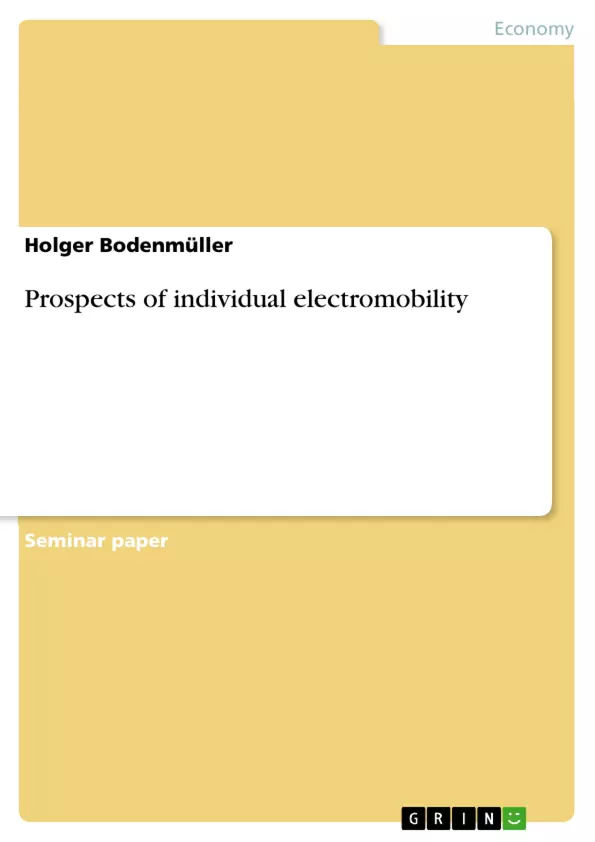Main drivers for the discussion of electromobility are the depletion of world’s oil resources and the evolving discussion of climate protection. Stricter CO2 regulations for all developed markets put a high pressure on the automotive industry. Automotive original equipment manufacturer (OEMs) are forced to transport a green image and claim the top position in terms of technological leadership. Future challenges can only be met by cooperation of different industries and politics. Political support and subsidies can speed up the introduction of electromobility. New competences are needed and production depth moves from the OEMs to suppliers. As long as fossil resources in particular coal play the predominant role in energy production the contribution of battery electric vehicles (BEVs) to CO2 reduction is low. Access to limited resources such as Lithium and rare earth will be critical and probably establish future dependencies. Manufacturing costs and total cost of ownership (TCO) will remain higher for an electric vehicle (EV) in the foreseeable future. Customers believe in the future of EVs but are not ready to pay higher prices. The estimated market share of hybrid electric vehicles (HEVs) and BEVs will not exceed 20% in 2025.
Inhaltsverzeichnis (Table of Contents)
- Introduction/Problem Definition
- Objectives
- Methodology
- Main Part
- Why is the independency of oil so important?
- Ecology: CO2 Regulations
- How clean are battery electric vehicles (BEVs)?
- Its all about the battery
- Electromobility requires cooperation
- Financial aspects
- Political Support in Germany
- What do customers expect?
- Conclusion
- ITM Checklist
- Bibliography
Zielsetzung und Themenschwerpunkte (Objectives and Key Themes)
This paper aims to analyze the prospects of individual electromobility, focusing on its potential to reduce dependence on fossil fuels and contribute to environmental sustainability. Key themes explored in this work include:- The importance of oil independence and the role of electromobility in achieving it
- The ecological impact of electromobility, particularly concerning CO2 emissions
- The technological challenges and opportunities associated with battery technology and its impact on electromobility's feasibility
- The economic aspects of electromobility, including costs, subsidies, and customer perception
- The importance of cooperation between industries and governments to promote the development and adoption of electromobility
Zusammenfassung der Kapitel (Chapter Summaries)
This chapter introduces the concept of individual electromobility and its relevance in the context of global oil resource depletion and climate change concerns. It also outlines the paper's objectives and methodology. This section examines the importance of reducing dependence on oil, emphasizing the geopolitical and environmental implications of fossil fuel reliance. Here, the author analyzes the CO2 emissions associated with electric vehicles (EVs) compared to traditional internal combustion engine (ICE) vehicles, highlighting the potential environmental benefits and challenges of electromobility. This chapter dives into the technical intricacies of battery technology, exploring its impact on EV performance, range, and cost. The author emphasizes the importance of collaboration between different industries and political actors to promote the development and adoption of electromobility. This section discusses the financial aspects of electromobility, examining the costs associated with EVs, government subsidies, and the overall total cost of ownership (TCO). The author explores the political support for electromobility in Germany, examining government policies and initiatives aimed at promoting the transition to electric vehicles. This chapter examines consumer perspectives on electromobility, analyzing customer expectations, purchase considerations, and the factors driving their adoption of EVs.Schlüsselwörter (Keywords)
This paper focuses on key concepts including individual electromobility, oil dependence, CO2 emissions, battery technology, cost of ownership, government subsidies, and customer perception. It explores the potential of electromobility to contribute to environmental sustainability and energy independence, while acknowledging the challenges associated with its widespread adoption.Frequently Asked Questions
What are the main drivers for the adoption of electromobility?
The primary drivers are the depletion of global oil resources and the urgent need for climate protection through CO2 reduction.
Are battery electric vehicles (BEVs) always environmentally friendly?
Their contribution to CO2 reduction is low as long as fossil resources, particularly coal, play a predominant role in energy production.
What is the predicted market share for electric vehicles by 2025?
The estimated combined market share of hybrid (HEVs) and battery electric vehicles (BEVs) is expected to not exceed 20% by 2025.
What are the critical resource challenges for EV manufacturing?
Access to limited resources such as Lithium and rare earth elements is critical and may establish future geopolitical dependencies.
How do consumers perceive the cost of electric vehicles?
While customers believe in the future of EVs, they are generally not ready to pay higher prices compared to traditional vehicles, as the total cost of ownership (TCO) remains higher.
What role does politics play in the transition to electromobility?
Political support and subsidies are essential to speed up the introduction and feasibility of electromobility in developed markets.
- Quote paper
- Holger Bodenmüller (Author), 2011, Prospects of individual electromobility, Munich, GRIN Verlag, https://www.grin.com/document/271648



